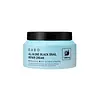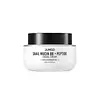What's inside
What's inside
 Key Ingredients
Key Ingredients

 Benefits
Benefits

 Concerns
Concerns

 Ingredients Side-by-side
Ingredients Side-by-side

Water
Skin ConditioningPropylene Glycol
HumectantCaprylic/Capric Triglyceride
MaskingCetyl Ethylhexanoate
EmollientGlycerin
HumectantNiacinamide
SmoothingStearic Acid
CleansingDimethicone
EmollientCetearyl Alcohol
EmollientPolysorbate 60
EmulsifyingSnail Secretion Filtrate
Skin ConditioningButyrospermum Parkii Butter
Skin ConditioningBeeswax
Emulsion StabilisingGlyceryl Stearate
EmollientPEG-100 Stearate
Phenoxyethanol
PreservativeCarbomer
Emulsion StabilisingTriethanolamine
BufferingSodium Polyacrylate
AbsorbentAllantoin
Skin ConditioningParfum
MaskingBenzyl Salicylate
PerfumingMacadamia Ternifolia Seed Oil
EmollientAdenosine
Skin ConditioningDisodium EDTA
Sodium Hyaluronate
HumectantWater, Propylene Glycol, Caprylic/Capric Triglyceride, Cetyl Ethylhexanoate, Glycerin, Niacinamide, Stearic Acid, Dimethicone, Cetearyl Alcohol, Polysorbate 60, Snail Secretion Filtrate, Butyrospermum Parkii Butter, Beeswax, Glyceryl Stearate, PEG-100 Stearate, Phenoxyethanol, Carbomer, Triethanolamine, Sodium Polyacrylate, Allantoin, Parfum, Benzyl Salicylate, Macadamia Ternifolia Seed Oil, Adenosine, Disodium EDTA, Sodium Hyaluronate
Snail Secretion Filtrate 88%
Skin ConditioningNiacinamide
SmoothingCetearyl Olivate
Sorbitan Olivate
EmulsifyingCaprylic/Capric Triglyceride
MaskingBetaine
HumectantCetearyl Alcohol
EmollientButylene Glycol
HumectantWater
Skin ConditioningTriethylhexanoin
MaskingPhenoxyethanol
PreservativeCyclohexasiloxane
EmollientCarbomer
Emulsion StabilisingEthyl Hexanediol
SolventArginine
MaskingAllantoin
Skin ConditioningSodium Polyacrylate
AbsorbentSodium Hyaluronate
HumectantDimethicone/Vinyl Dimethicone Crosspolymer
Skin ConditioningXanthan Gum
EmulsifyingPanthenol
Skin ConditioningAdenosine
Skin Conditioning1,2-Hexanediol
Skin ConditioningCopper Tripeptide-1
Skin ConditioningPalmitoyl Pentapeptide-4
Skin ConditioningAcetyl Hexapeptide-8
HumectantPalmitoyl Tripeptide-1
Skin ConditioningPalmitoyl Tetrapeptide-7
Skin ConditioningSnail Secretion Filtrate 88%, Niacinamide, Cetearyl Olivate, Sorbitan Olivate, Caprylic/Capric Triglyceride, Betaine, Cetearyl Alcohol, Butylene Glycol, Water, Triethylhexanoin, Phenoxyethanol, Cyclohexasiloxane, Carbomer, Ethyl Hexanediol, Arginine, Allantoin, Sodium Polyacrylate, Sodium Hyaluronate, Dimethicone/Vinyl Dimethicone Crosspolymer, Xanthan Gum, Panthenol, Adenosine, 1,2-Hexanediol, Copper Tripeptide-1, Palmitoyl Pentapeptide-4, Acetyl Hexapeptide-8, Palmitoyl Tripeptide-1, Palmitoyl Tetrapeptide-7
 Reviews
Reviews

Ingredients Explained
These ingredients are found in both products.
Ingredients higher up in an ingredient list are typically present in a larger amount.
Adenosine is in every living organism. It is one of four components in nucleic acids that helps store our DNA.
Adenosine has many benefits when used. These benefits include hydrating the skin, smoothing skin, and reducing wrinkles. Once applied, adenosine increases collagen production. It also helps with improving firmness and tissue repair.
Studies have found adenosine may also help with wound healing.
In skincare products, Adenosine is usually derived from yeast.
Learn more about AdenosineAllantoin is a soothing ingredient known for its protective and moisturizingg properties. Because of this, it is often added to products with strong active ingredients.
Studies show higher concentrations of this ingredient can promote wound healing.
Though it can be derived from the comfrey plant, allantoin is produced synthetically for cosmetic products to ensure purity.
Learn more about AllantoinThis ingredient is an emollient, solvent, and texture enhancer. It is considered a skin-softener by helping the skin prevent moisture loss.
It helps thicken a product's formula and makes it easier to spread by dissolving clumping compounds.
Caprylic Triglyceride is made by combining glycerin with coconut oil, forming a clear liquid.
While there is an assumption Caprylic Triglyceride can clog pores due to it being derived from coconut oil, there is no research supporting this.
Learn more about Caprylic/Capric TriglycerideCarbomer is a polymer of acrylic acid. Its main role is to create a gel consistency.
A high amount of carbomer can cause pilling or balling up of products. Don't worry, most products contain 1% or less of carbomer.
Cetearyl alcohol is a mixture of two fatty alcohols: cetyl alcohol and stearyl alcohol. It is mainly used as an emulsifier. Emulsifiers help prevent the separation of oils and products. Due to its composition, it can also be used to thicken a product or help create foam.
Cetearyl alcohol is an emollient. Emollients help soothe and hydrate the skin by trapping moisture.
Studies show Cetearyl alcohol is non-toxic and non-irritating. The FDA allows products labeled "alcohol-free" to have fatty alcohols.
This ingredient is usually derived from plant oils such as palm, vegetable, or coconut oils. There is debate on whether this ingredient will cause acne.
Due to the fatty acid base, this ingredient may not be Malassezia folliculitis safe.
Learn more about Cetearyl AlcoholNiacinamide is a multitasking form of vitamin B3 that strengthens the skin barrier, reduces pores and dark spots, regulates oil, and improves signs of aging.
And the best part? It's gentle and well-tolerated by most skin types, including sensitive and reactive skin.
You might have heard of "niacin flush", or the reddening of skin that causes itchiness. Niacinamide has not been found to cause this.
In very rare cases, some individuals may not be able to tolerate niacinamide at all or experience an allergic reaction to it.
If you are experiencing flaking, irritation, and dryness with this ingredient, be sure to double check all your products as this ingredient can be found in all categories of skincare.
When incorporating niacinamide into your routine, look out for concentration amounts. Typically, 5% niacinamide provides benefits such as fading dark spots. However, if you have sensitive skin, it is better to begin with a smaller concentration.
When you apply niacinamide to your skin, your body converts it into nicotinamide adenine dinucleotide (NAD). NAD is an essential coenzyme that is already found in your cells as "fuel" and powers countless biological processes.
In your skin, NAD helps repair cell damage, produce new healthy cells, support collagen production, strengthen the skin barrier, and fight environmental stressors (like UV and pollution).
Our natural NAD levels start to decline with age, leading to slower skin repair, visible aging, and a weaker skin barrier. By providing your skin niacinamide, you're recharging your skin's NAD levels. This leads to stronger, healthier, and younger looking skin.
Another name for vitamin B3 is nicotinamide. This vitamin is water-soluble and our bodies don't store it. We obtain Vitamin B3 from either food or skincare. Meat, fish, wheat, yeast, and leafy greens contain vitamin B3.
The type of niacinamide used in skincare is synthetically created.
Learn more about NiacinamidePhenoxyethanol is a preservative that has germicide, antimicrobial, and aromatic properties. Studies show that phenoxyethanol can prevent microbial growth. By itself, it has a scent that is similar to that of a rose.
It's often used in formulations along with Caprylyl Glycol to preserve the shelf life of products.
Snail Secretion Filtrate is the excretion from snails. It is an effective moisturizer and promotes collagen production.
A popular nickname for this ingredient is 'Snail Mucin'.
Snail mucin has numerous skin benefits:
On top of this, Snail Secretion Filtrate contains a variety of vitamins and minerals. These include copper peptides, Vitamin A, and vitamin E. Vitamins A and E are antioxidants. Antioxidants help fight free-radicals that damage skin cells.
Being cruelty-free means a brand does not experiment on animals.
If you're worried about the well-being of the snails, we recommend looking more into the company of the product. Many brands have developed humane methods to collect snail mucin.
There is much debate on this subject. On one hand, this ingredient comes from an animal. On the other hand, many will argue the ingredient is naturally secreted (like a natural by-product) and therefore vegan. If you have reservations, you can look into Galactomyces Ferment Filtrate or Centella Asiatica Extract as alternatives.
Learn more about Snail Secretion FiltrateSodium Hyaluronate is hyaluronic acid's salt form. It is commonly derived from the sodium salt of hyaluronic acid.
Like hyaluronic acid, it is great at holding water and acts as a humectant. This makes it a great skin hydrating ingredient.
Sodium Hyaluronate is naturally occurring in our bodies and is mostly found in eye fluid and joints.
These are some other common types of Hyaluronic Acid:
Learn more about Sodium HyaluronateSodium Polyacrylate is the sodium salt of polyacrylic acid. It is used as an absorber, emollient, and stabilizer.
This ingredient is a super-absorbent polymer - meaning it can absorb 100 to 1000 times its mass in water. As an emollient, Sodium Polyacrylate helps soften and soothe skin. Emollients work by creating a barrier to trap moisture in. This helps keep your skin hydrated.
Water. It's the most common cosmetic ingredient of all. You'll usually see it at the top of ingredient lists, meaning that it makes up the largest part of the product.
So why is it so popular? Water most often acts as a solvent - this means that it helps dissolve other ingredients into the formulation.
You'll also recognize water as that liquid we all need to stay alive. If you see this, drink a glass of water. Stay hydrated!
Learn more about Water